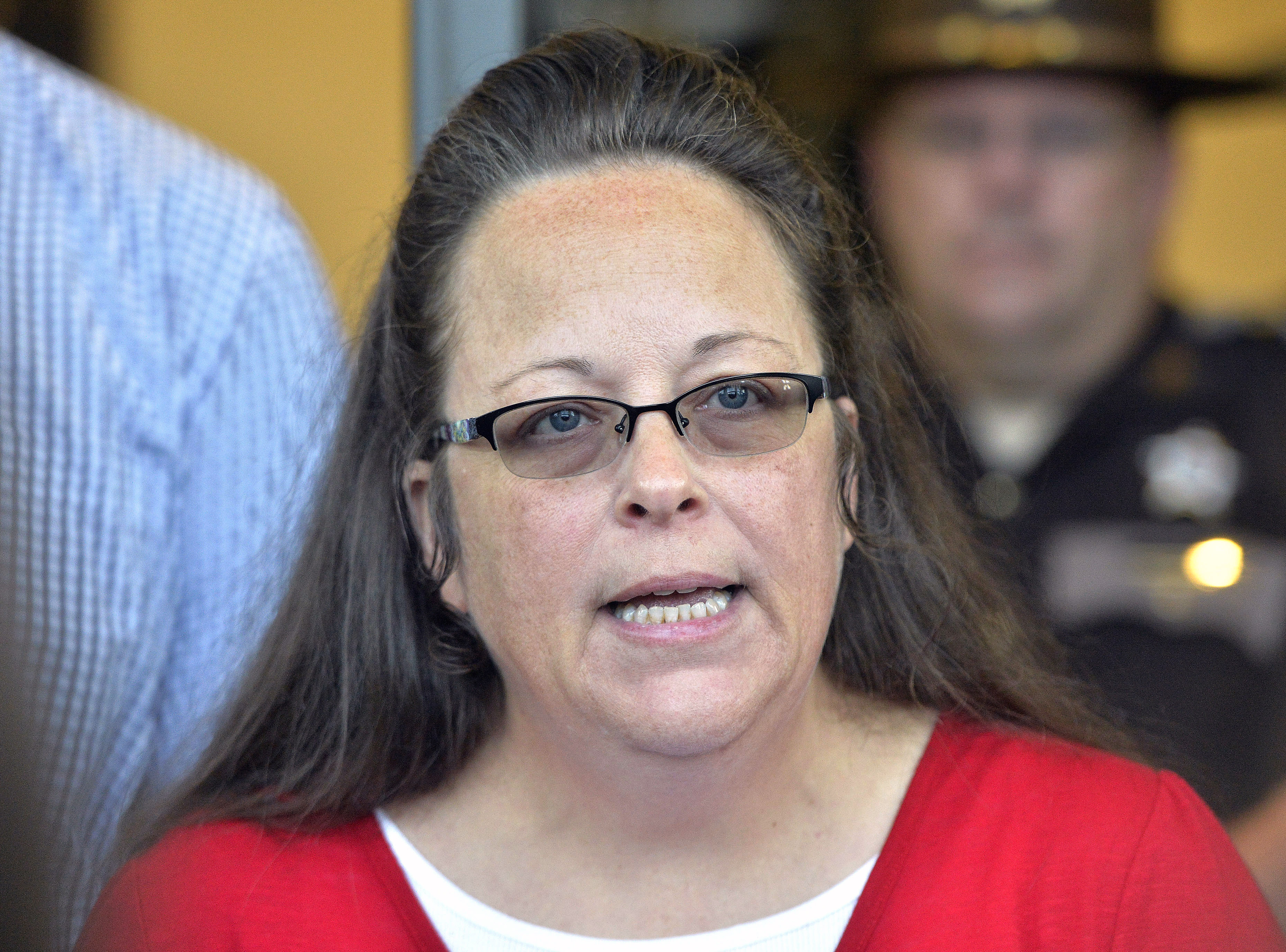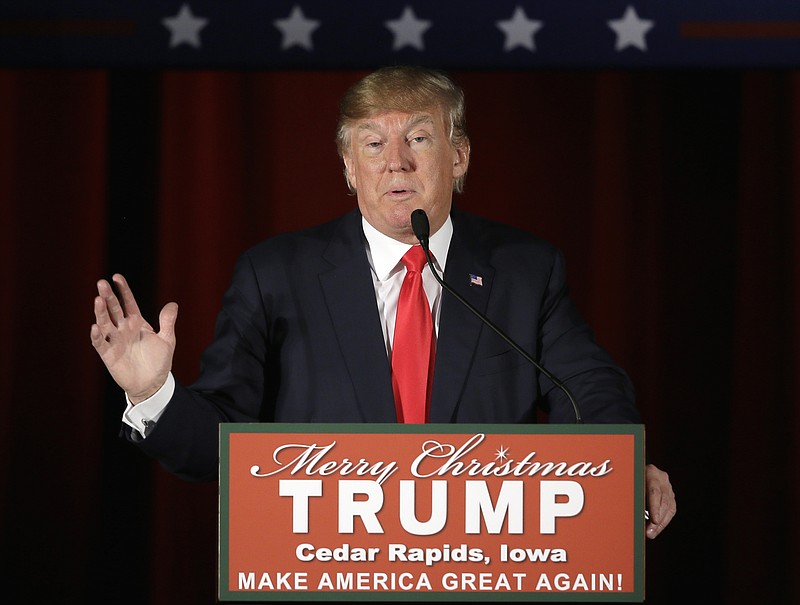 FILE - In this Sept. 14, 2015, file photo Rowan County, Ky. Clerk Kim Davis speaks in Morehead, Ky. Americans place a higher priority on preserving the religious freedom of Christians than other faith groups, ranking Muslims as the least deserving of the protections, according to a new poll from The Associated Press-NORC Center for Public Affairs Research. (AP Photo/Timothy D. Easley, File)
FILE - In this Sept. 14, 2015, file photo Rowan County, Ky. Clerk Kim Davis speaks in Morehead, Ky. Americans place a higher priority on preserving the religious freedom of Christians than other faith groups, ranking Muslims as the least deserving of the protections, according to a new poll from The Associated Press-NORC Center for Public Affairs Research. (AP Photo/Timothy D. Easley, File)Poll details
The AP-NORC poll of 1,042 adults was conducted online and by phone using a sample drawn from NORC’s probability-based AmeriSpeak panel, which is designed to be representative of the U.S. population. The margin of sampling error for all respondents is plus or minus 3.9 percentage points.
Reader reaction
“I think protecting religious freedom shouldn’t be limited to one religion. People think Muslims equals radicals, but that’s not even remotely true most of the time. If one religion deserves liberty, all of them do.”Hayley Nichole Crawford, Tullahoma“Each religion has its own agenda and each group that follows it has their own beliefs. We may have a number of religions that differ in opinions, but we should have the liberty to follow whatever that belief is under the law of man. I am a Christian myself, so I think I should practice my religion within the law of man because the Bible says to do so.Barry Wilson, Cleveland, Tenn.“Religious freedom is one thing, but there are way too many whose interpretation of religious ‘freedom’ is pushing an agenda that places their particular beliefs above everyone else’s.”Jason Grant“As an atheist, religious freedom is very important to me. If people want to believe in magical sky buddy, that is their right and I will fight to protect it. It is not for me, you, or any government, to be the arbiter of what is valid faith and what isn’t.”Chris Beasley, East Lansing, Mich.“You have to protect all religions, or none at all. I’m for not at all!”Jay Rangel, Chattanooga
Christians? Absolutely. Jews? Yes. Mormons? Sure. Muslims? Uh, OK.
These are the ultimate opinions in a recent survey of Americans on whether various denominations deserve to have their religious freedoms protected in the U.S. The highest percentage of respondents said Christians should have their freedoms preserved, with Jews and Mormons coming in somewhat lower. Muslims came in dead last.
According to the poll, conducted by the Associated Press and the NORC Center for Public Affairs Research, solid majorities across the board said it was extremely or very important for the U.S. to uphold religious freedom in general, but the percentages varied dramatically when respondents were asked about specific faiths.
In the survey, 82 percent said religious liberty protections were important for Christians, compared with 61 percent who said the same for Muslims. About 70 percent said preserving Jews' religious freedom was important, while 67 percent said Mormons' freedoms needed protection.
The findings dismayed several local Christian leaders.
"The variation (of support for Jews, Muslims and Mormons) smacks of prejudice and shows a lack of understanding of the historical basis for the First Amendment," says Clay Thomas, pastor at Rivermont Presbyterian. "Religious minorities will always be the most at risk for having their rights violated."
Josh Woodrow, pastor of the Bridge City Community, says he was raised in the San Francisco area and "the vast majority of my friends growing up were of a different faith/ethnic background than me. I grew up Christian but had Muslim, Hindu, Buddhist and agnostic friends.
"I am grateful for the religious liberty afforded me as a Christian pastor in America," he says. "However, we do not live in a Christian theocracy/caliphate and, as such, American Christians can't make bias demands on religious liberties or freedoms."
Kevin Adams, pastor at Olivet Baptist Church, simply quoted Scripture after seeing the poll numbers.
"Jesus said, 'All they that take the sword shall perish with the sword' (Matthew. 26:52)" and "The sword we use against any religion will be used against all religions. Let all speak, so that all may be convinced of the supremacy of the Lord Jesus Christ. (Romans 1:16)."
Doug Fairbanks, pastor at First Centenary Methodist, says "religious freedom is a cornerstone of who we are and must be safeguarded for all of us if any of us are to be free to worship as we choose. We must continue to build bridges of understanding, love and hope.
"Now, our founding fathers were probably more secular than we would like to admit," he says. "Yet, they understood that a truly free people desire to respect all people, especially when it came to religious freedom."
The poll took place Dec. 10-13 after Islamic extremist attacks in Paris and San Bernardino, Calif., and during intensifying anti-Muslim rhetoric by Donald Trump and other candidates for the Republican presidential nomination.
And the poll's percentages differed depending on political party. Eighty-eight percent of Republicans said it was important to protect the religious liberty of Christians, while only 60 percent said so for Muslims. Democrats also ranked religious freedom for Muslims as a lower priority. Eighty-three percent of Democrats said the protections were important for Christians, while only 67 percent said so for Muslims.
"These numbers seem to be part of a growing climate of anti-Muslim sentiment in the United States," Madihha Ahussain, an attorney for Muslim Advocates, a California-based civil rights group, told the Associated Press.
Charles Haynes, director of the Religious Freedom Center of the Newseum Institute, told the AP that the findings reflect deep divisions among Americans about the very definition of religious liberty, which has taken on newly politicized meanings in a time of debate over gay marriage and the threat from Islamic extremists.
"Religious freedom is now in the eye of the beholder," Haynes said. "People in different traditions, with different ideological commitments, define religious freedom differently."
Recent AP-NORC polls also have found dwindling confidence in the government's defense of religious liberty, with 75 percent in 2011 saying the government was doing a good job, compared with 55 percent who said so this month.
"World religions such as Christianity, Islam and Buddhism share at least one thing in common: We all wish everyone agreed with us," says Greg Nance, minister at Signal Mountain Church of Christ. "But in our world, governments often dictate the leading religious denomination of the nation, he notes, something that has changed in the U.S.
"Up until recently our government defined itself as a Christian nation and showed greater respect to all things Christian," Nance says. "Now that we have lost that, the government will either favor another religion or it will assert its will over all religious practices. What we are witnessing today is an assertion over against traditional Christian convictions in favor of non-religious values."
Public discussion about religious freedom in 2015 focused largely on demands for government accommodation for objectors to same-sex marriage, which became legal nationwide in June. The debate played out most dramatically in the case of Kentucky clerk Kim Davis, who spent five days in jail for refusing to issue marriage licenses to same-sex couples.
Greg Scott of the Alliance Defending Freedom, a Christian public interest law firm, told the AP that a focus on protecting Christians right now "makes sense in that Christians today are facing mounting threats to their religious liberty by acts of state officials and bureaucrats."
But Eric Rassbach, an attorney with the Becket Fund for Religious Liberty, a public interest law firm that takes clients of all faiths, says "people may not realize you cannot have a system where there's one rule for one group and another rule for a different group you don't like."
"No religion is an island," Rassbach says. "If somebody else's religion is being limited by the government, yours is liable to be limited in the same way. Even if you only care about your own particular group, you should care about other groups, too, because that's the way the law works."
The Associated Press' Rachel Zoll and Emily Swanson contributed to this story.
